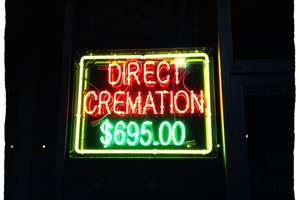Eulogy is pronounced like this: /Yule-ah-gee/
A eulogy is simply a speech about a loved one who has died.
This speech is usually given during a memorial or funeral ceremony. While it is often given by a close friend or relative of the deceased, it can also be given by a religious leader.
Don’t stress out over giving a eulogy.
Think of it as a simple conversation with the family and friends about the life of the person who has died. Remember, the funeral or memorial ceremony is usually only attended by people that somehow mattered to the deceased. They are eager to hear about the deceased and will appreciate anything you say.
Almost EVERYONE is afraid of speaking in public
The “audience” is NOT expecting you to give a flawless speech. If fact, if you “mess up” a little (or a lot), the audience tends to rally around you even more. They really do!
There is no “right way” to compose a eulogy.
Since most people have no idea what a eulogy is supposed to sound like, you can pretty much create it any way you want. Here are some things you may want to talk about:
- a brief “life history” of the person who has died
- important achievements and events in the deceased’s life
- details about family, friends, work, and hobbies
- favorite memories of the deceased
Most eulogies last between 5 and 15 minutes but there are no hard and fast rules here. You can also deliver “vignette” eulogies. This is where several different people take turns speaking about the deceased. For example, each of the children of a deceased parent could give a small speech about their favorite respective memory with the deceased.
Breaking a single eulogy into separate vignettes gives others a chance to participate in the services and takes the pressure off of just one speaker. Even if each person speaks for just a little while, it will seem like a longer, more robust speech because it takes time for each person to walk up to the podium and then return to their seat.
Basic steps for writing a eulogy:
- Write a brief chronological outline of the key events that occurred in the person’s life from the time of birth until death. This will often remind you of several pivotal events experienced by the person (e.g. graduating from college, getting married, serving in the military, starting a business, etc.) that may be worth mentioning.
- Write down your favorite memories of the deceased. Ask others (friends, relatives, co-workers) if they have favorite memories you can share. Often times people have things they want to say during the funeral but they are either afraid to speak or aren’t afforded an opportunity.
- Make a list of some of the things that were important to the deceased person….things he/she was passionate about. This may trigger stories of their own that you can incorporate into your speech.
- Combine all your thoughts, ideas, comments, and memories into one giant list. Review this list and decide which things you want to include in your speech.
- Organize your chosen comments into some type of order. For example you might want to organize by:
- Chronological date the events occurred
- Common themes (e.g. family, career, work, hobbies)
- Speaker (if you plan on using vignette eulogies); develop a schedule that shows when each person is to speak.
More eulogy tips
Write out your speech. You may feel more comfortable writing out the entire speech or you may just decide to use note cards with a few sentences that will trigger your memory so you remember what it is you want to say. Again, there is no one right way. Some people will commit the speech to memory and never need to refer to their notes; others will look at their speech and read it word-for-word without ever looking at the audience. Use whatever method is most natural for you.
Your speech can be serious, light-hearted, or a combination of both. A mix of both seriousness and humor is most popular. Funerals are a combination of sadness and celebration. People will grieve at funerals, but it’s OK to laugh too. It really is!
Also, since no one but you will ever see what you have written you don’t need to worry about grammar or spelling. All you need is to have something in writing that will remind you of what it is you want to say.
Practice saying your speech out loud while in front of a mirror. This will help you develop a natural speaking rhythm and will highlight any verbal or physical habits that could be a distraction to your audience.
Remember to take a clean copy of your speech with you to the funeral home. You can either write it out word-for-word or just make a few necessary note cards to trigger your memory. (Make sure you number the note cards so you can keep them in order.)
Delivering the eulogy:
Focus on honoring the deceased instead of worrying about how your speech will sound to others.
- Take deep breathes before beginning your speech. This will help you regain composure and slow your heart rate down. This will also help you speak in a slower, more controlled manner.
- Take a drink of water before speaking (or take something to drink with you to the podium) to keep your mouth from getting dry.
- Remember: that it's OK to show emotion. If you become emotional and start to cry, that's perfectly normal (even if you are a guy!). No one will think any less of you. Take time to regain your composure, but if you're unable, simply say “I am sorry, but I can’t go on right now” and return to your seat. The funeral director or clergy member will step in and continue the ceremony from where you let off.
One final thought: It’s an honor to be asked to give a eulogy. You wouldn’t have been picked if you weren’t special to the deceased in some way. Others know this and they will EXPECT you to be grieving too.
See what a funeral costs in these popular cities:
Atlanta | Austin | Boston | Chicago | Dallas | Denver | Detroit | Honolulu | Houston | Los Angeles | Miami | Minneapolis | New York | Philadelphia | Portland | Sacramento | San Diego | San Francisco | San Jose | Seattle | Washington, DC










